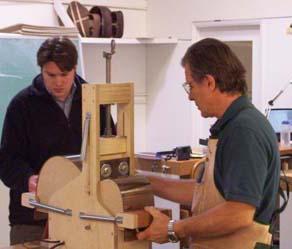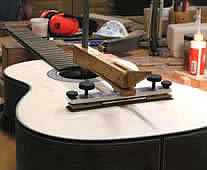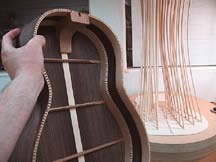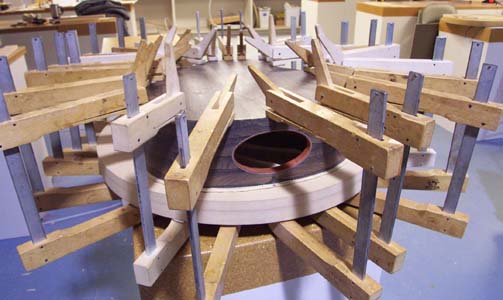American School of Lutherie
expert training for luthiers of all levelsHands-On Acoustic Guitar Making
Hands-On Electric Guitar Making
Contemporary Guitar Making
Advanced Design Features
Setup, Maintenance & Basic Repair
Small Shop Production
SMALL SHOP PRODUCTION
SMALL SHOP PRODUCTION
Duration: 5 daysClass format: lecture & demonstration seminar
Enrollment is limited to six students. Class runs from 9am to 6pm or later, Monday through Friday. This class assumes previous guitar making experience. Please email with any questions, or call to speak with us personally.
Tuition: $1200
SMALL SHOP PRODUCTION is a five-day workshop focused on boosting both the accuracy and consistency of your work, and your output, while minimizing wasted effort and time. The goal is to achieve higher levels of quality and efficiency by incorporating specialized jigs, fixtures and other useful devices, dedicated work stations, and proven organizational patterns into your work routine. I'll demonstrate these things as they apply to every phase of guitar making and I'll explain how to adapt them to suit your own workspace, intentions and resources. We'll also visit some of Portland's finest luthiers and learn what they do to maximize the quality and efficiency of their own work.
RAISING THE BAR
Making guitars of any quality, at any pace, is challenging enough for most of us. At first, we're happy just to be doing this marvelous work and we find satisfaction in each new accomplishment. But add a commitment to higher quality and productivity and the limitations of our original skill set become apparent. We can't simply work better and faster at what we're already doing to produce the more mature work that we envision.
MOVING FORWARDThe growth of lutherie skills is episodic, advancing from one instrument to the next. As a result, progress along the path toward mastery depends largely on the number of guitars you can complete in the time that's available. If your procedures are limited to the methodology of whatever class, book or DVDs you followed to get started, they are almost certainly not focused on efficiency and productivity. Indeed, they're likely not the methods best matched to your personal strengths and as a result probably not the ideal skill set for realizing your full potential as a luthier.
YOUR OWN BEST WAY
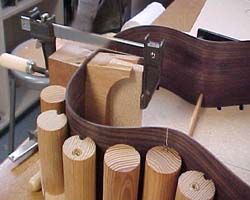
Somewhere between making guitars one at a time with hand tools, and using computerized machines to produce a steady stream of product, there's an approach to guitar making that's just right for you - an approach that maximizes both your output and the quality of your work while providing personal satisfaction and inspiring personal growth. There are many ways to set up a shop for increased production, but the best way for you to go about building guitars won't be exactly like anyone else's approach.
WORKING BETTER, FASTER
Every luthier enjoys saving precious time and energy, but being more prolific becomes absolutely critical for anyone who would earn a living building and selling instruments. Once you've minimized your costs and found the price for which you can sell all the guitars that you can make, you can increase your bottom line by producing more instruments in the time that's available. How to do this without either compromising the quality of your work or losing your enjoyment of it is a question that each luthier must consider carefully.
Tooling - We'll examine all of the hand tools, power tools and woodworking machinery that make up the luthier's tool kit, along with specialized easy-to-make guitar making jigs and fixtures that will increase both your output and the precision and consistency of your work. We'll discuss the few basic principles around which most jigs and fixtures can be designed, and we'll examine many examples of affordable time-saving guitar making devices and dedicated work stations.
Processes - There are so many different ways to do every guitar making task, but most luthiers are unaware of alternative processes from the manufacturing world and from other cultures. We'll review options at each stage of the guitar making process and identify choices that offer high productivity and are easily adaptable to our space and means.
Organization - Even the smallest workshop can be organized around the sequential stages of the craft. Where space is limited, one or two versatile generic work stations and a system of specialized work boards can turn a few square feet into a compact, highly productive work space. Tools, jigs, etc. can be organized to minimize their setup and teardown time. Materials and supplies can be stored to minimize the effort of inventory tracking and timely re-ordering.
Work Flow - Guitars can be built either one at a time, a few at a time overlapping, in small batches, large batches, or non-stop every-station-filled 'like piglets through a python'. We'll look at the pros and cons of each approach. Similarly, we'll study a number of ways to track and record each instrument's progress, from the order through shipping, and determine what approach might be most appropriate depending on the scale and style of your work schedule.
